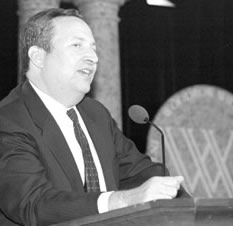INVESTIGATIVE DOCUMENTS - Related articles
The Yale Herald, October 26, 2001.
U.S. suit against Harvard seeks $120M
|
By Ted Diskant
In 1993, Lawrence Summers began his work at the Treasury Department as undersecretary of the treasury for international affairs. Charged with formulating international economic policy, Summers took over the post at a key time, as Russia was struggling to establish an open system of Western capitalism.
Summers praised the "collaborative" efforts in Russia, citing the work Russian leader Anatoly Chubais and his "dream team" were doing with American economists. The Americans, among them Andrei Shleifer and Jonathan Hay, were Harvard professors leading the Harvard Institute for International Development's (HIID) effort to bring about economic reform in the nascent free-market nation. HIID's initiative, supported and paid for by the U.S. government, began in 1992 and cost the government nearly $60 million over the span of five years.
Today, Summers is the 27th president of Harvard. And his University is being sued for $120 million by the American government, which alleges that both Harvard and the professors who led the HIID program defrauded the government.
THE SUIT, WHICH WAS FILED IN DISTRICT COURT IN Boston, Mass., in September of 2000 but is only now beginning to proceed toward trial, accuses Shleifer and Hay of misrepresenting their purpose in completing the work the government was paying Harvard to do. Shleifer and Hay "abused the trust of the U.S. government by using personal relationships...for private gain," the complaint alleges.
"They're being sued under the false claims act," Johns Hopkins Law Professor Dan Guttman, LAW '71, said. "Harvard represented that it would be free of bias and it wasn't." Not only did Harvard professors working in Russia allegedly take advantage of the very privatization acts they were supposed to be coordinating and advising, but according to Janine Wedel, a professor at the University of Pittsburgh who has published on the subject, the very "collaboration" that Summers praised was actually closer to collusion. "The Harvard group was working with the Chubais group at the expense of the people they were supposed to be helping. They got together and maximized their own opportunities," Wedel said.
For its part, Harvard is accused of failing to supervise its employees and failing to ensure the successful completion of the goals outlined by the program.
"Harvard's actions, instead of fostering trust and openness in the nascent mutual market fund, in fact involved exactly the type of favoritism and the perceived and actual barriers to entry and success that the U.S. was spending hundreds of millions of dollars to dispel," the complaint alleges.
Staff in the offices of Harvard President Lawrence Summers and General Council Anne Taylor all referred calls for comment to the university's Office of News and Public Affairs. Citing the "ongoing nature of the litigation," News Office Director Joe Wrinn declined to comment.
THE SUIT ITSELF IS INDICATIVE NOT ONly of the increasing level of private involvement in foreign affairs, but the concerns that have been raised as a result. "It is a reality that the U.S. government cannot support the full depth of what is needed abroad, and that includes foreign aid," Strobe Talbott, SM '68, former deputy Secretary of State and director of the new Yale Center for Global Studies, said. "A lot of that is going to have to come from the private world, and included in that are universities."
Yale has taken on its own international projects, most notably in China. The new China Law Center is working towards judicial reform in the nation while the School of Management (SOM) has met with Chinese leaders to discuss methods of market reform. Last spring, University President Richard Levin, GRD '74, led a Yale convoy on a two-week trip through China.
In the wake of the Russia project and the current lawsuit, Harvard decided last spring to abolish the HIID, a decision Wrinn insists was "purely academic." But the university continues to do work abroad, and other university departments have picked up many former HIID programs. Former HIID director Jonathan Sachs was unavailable for comment this week as he was in Korea, the site of one of Harvard's many ongoing international efforts.
BUT AS THE LAWSUIT SUGGESTS, PRIVATE ACTORS working in areas of foreign policy can be potentially dangerous. Citing the Harvard case, Guttman noted, "The basic premise that the government polices this stuff is simply not true. Government officials come and go. More and more decision-making authority falls into private hands. And private individuals do not have the same accountability that public officials do."
Talbott echoed Guttman's concern. "Obviously, what goes on within the private sector, particularly if funded by public dollars, has to be scrupulous," he said. But acknowledging the current lawsuit, he admitted, "there are going to be breakdowns in that, and Harvard's involvement in Russia was obviously one of those."
The suit against Harvard is particlarly troubling, according to Guttman, because it represents a case in which the government made substantial efforts to prevent the very type of corruption they are now alleging. "There was a good conflict of interest provision in the contract [between Harvard and the government]," Guttman said. "It highlights the absence of any assumption of control over the program on the University's behalf. It's a very serious problem."
Wedel, the University of Pittsburgh professor, also noted that it was particularly troubling that Harvard's position at "the top level of American influence" kept any government supervision from being applied too strictly. "Because of Harvard's prestige and power, investigations never really went anywhere," she said.
For just such reasons, Guttman has come to view the privatization of foreign policy as infeasible. "Foreign policy is inherently a governmental function. It is supposed to be conducted by officials," he said. "The fact that private agents have taken it on is a dirty little secret, and the Harvard case obviously punctuates that."
IN SOME WAYS, YALE HAS MANAGED TO AVOID THE problems Harvard is now facing by acting without the financial support of the federal government. "We have made a lot of informal connections," Levin said, describing the University's current commitment to China. "We haven't established any formal programs."
While admitting that he had discussed Yale's foreign contacts with members of the Clinton and Bush administrations, he noted that none of the programs led by the SOM or the China Law Center were being funded with government money. As Will Goetzman, the director of the Center for International Finance at SOM, said, "We really don't want to replicate Harvard's mistakes in Russia."
And Talbott noted that his Center for Globalization is currently pursuing a "number of projects similar to HIID's work in Russia." But he emphasized that "we have no intention of asking for, using, or getting government money."
IN MAINTAINING PRIVATELY-RUN PROGRAMS, YALE has managed to take an active role in international politics while avoiding the potential pitfalls of government-supported programs. "I think it's great that universities get involved in global efforts to establish contacts overseas," Wedel said. "Where I think the problem lies is when a government sort of delegates foreign policy to a private party and has so much faith that it fails to monitor those efforts."
And while the government's pending $120 million suit against Harvard may serve as a reminder of the potential danger of private involvement in foreign policy, Talbott, among, others has little doubt that the private sector must continue to play a part in representing American interests abroad. "The foreign aid budget has seen a more than 50 percent drop since the height of the Cold War," Talbott said. "We are devastatingly under-funded. And a lot of what we need to do abroad, we can't afford to do without the help of the private sector."
Available online at: The Yale Herald, October 26, 2001.


